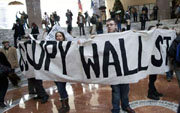-
(单词翻译:双击或拖选)
'Word on Street' Impacted Language in 2011
While 2011 is over, some of the words that came to define the past year are still very much with us, and may be for years to come.
Since 2011 was an especially busy year for grassroots political action, many of those new terms came from the streets.
Occupy
Grant Barrett, vice1 president of the American Dialect Society and host of the public radio program “A Way with Words,” says even in a nation as talkative as the United States, and with a language as flexible and creative as English, the word “occupy” stood apart in 2011.
“This was used in phrases like ‘Occupy Wall Street’ or 'Occupy San Francisco,’ or frankly2 ‘occupy’ just about any place," he says. "And this was a word coined by an organization in Canada called “Adbusters,” which started a campaign last summer to get people in October to protest in the streets, to protest the unfair distribution of wealth and the unfair distribution of power, and ‘occupy’ really has had a lot of legs, as they say, a lot of life.”
Barrett observes the word also has a lot of flexibility3.
“And so, in that way, ‘occupy’ has become what we call a ‘combining form.’ So it can be combined with verbs and nouns and adjectives in order to create new phrases and new expressions that filter throughout the whole movement.”
 |
| Occupy Wall Street protesters at Three World Financial Center in New York, Dec. 12, 2011. |
The occupy movement is peopled by those calling themselves “99 percenters.”
“These are terms that represent the majority of Americans. These are the people who say ‘Look, I’ve worked hard. I’ve got an education. I do what I’m told to do. And yet, somehow, I’m not among the decision makers," says Barrett. "I am excluded from the political process. I’m excluded from having my voice heard.’ And there is one percent of the population - the ‘one-percenters’ - who seem to have all the money and all the power and all the control.”
Borrowing from past
The occupy movement has borrowed methods and terms from protests of the past, including the use of the so-called “human megaphone.”
“In order not to violate laws about electronic amplification4, what they would do is a speaker would say something," Barrett says. "They would say, ‘I would like to tell you my opinion,’ and the whole crowd repeats exactly what the speaker just said to make sure that everyone else who is farther away can hear it.”
“Occupiers” also used a variety of non-verbal communications. Holding the arms crossed in front of the chest is called a “hard block” and means “firm opposition5.” Barrett also saw occupiers "twinkling." The gesture is similar to a hand motion the deaf and hard-of-hearing community uses to signify applause.
While many new words and phrases occupied American speech last year, Barrett says he cannot predict which ones will become a permanent part of the American lexicon6.
“You just never know. It's a bit of a gamble," he says. "I would say, at least as an historical footnote, ‘occupy’ and all the related terms will continue to be talked about. It will show up in history books."
Arab Spring
As will the phrase “Arab Spring,” according to Barrett. By the end of 2011, it was a term often used by many; including protesters, journalists and humanitarian7 activists8.
Heba Morayef of Human Rights Watch was one of them.
“One of the scenes that we’ve seen in many of the Arab Spring countries, first in Tunisia, then in Egypt, then in Libya and Syria are these images, usually of young men," she said in an interview late last year, "who are willing to die for ideals of freedom, for notions of rights in front of security officials with guns in city after city and this new courage to stand up to abuse we have seen, really is what has fueled the Arab Spring."
“In this two word phrase we have encapsulated, we’ve made shorthand for, a lot of really important history,” Barrett says.
 收听单词发音
收听单词发音
1
vice

|
|
| n.坏事;恶习;[pl.]台钳,老虎钳;adj.副的 | |
参考例句: |
|
|
|
2
frankly

|
|
| adv.坦白地,直率地;坦率地说 | |
参考例句: |
|
|
|
3
flexibility

|
|
| n.柔韧性,弹性,(光的)折射性,灵活性 | |
参考例句: |
|
|
|
4
amplification

|
|
| n.扩大,发挥 | |
参考例句: |
|
|
|
5
opposition

|
|
| n.反对,敌对 | |
参考例句: |
|
|
|
6
lexicon

|
|
| n.字典,专门词汇 | |
参考例句: |
|
|
|
7
humanitarian

|
|
| n.人道主义者,博爱者,基督凡人论者 | |
参考例句: |
|
|
|
8
activists

|
|
| n.(政治活动的)积极分子,活动家( activist的名词复数 ) | |
参考例句: |
|
|
|















